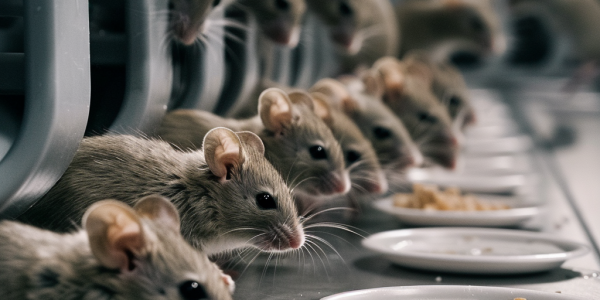Research Links Swallowing Mechanism to Binge Eating
Recent research from the University of Bonn reveals a crucial link between swallowing and overeating, suggesting that the act of swallowing may drive our desire to eat more by releasing serotonin, the ‘feel-good’ hormone. This study, which utilized fruit fly larvae to explore eating behaviors, highlights the importance of both physiological and psychological factors in managing eating habits and addressing issues like binge eating and anorexia. Understanding these mechanisms could lead to innovative strategies for promoting healthier eating patterns.
Study Reveals Role of PSTN in Regulating Feeding and Drinking Behaviors in Mice
Learn about the recent study published in Molecular Psychiatry that uncovers the role of the parasubthalamic nucleus (PSTN) in regulating feeding and drinking behaviors in mice. Researchers found that PSTN neurons impact the initiation of feeding and drinking in hungry and thirsty mice, shedding light on the neural circuits involved in these behaviors.
Raising Me Podcast Discusses Rise in Eating Disorders Among Children During Pandemic
Learn about the concerning rise in disordered eating and eating disorders, particularly in children, exacerbated by the challenges of the pandemic. Hear valuable insights on recognizing warning signs and fostering a healthy relationship with food and nutrition in children from experts on the Raising Me podcast.
EDCare Expands Eating Disorder Treatment Services with Virtual IOP Program
Discover how EDCare’s new Virtual Intensive Outpatient Program (IOP) is revolutionizing eating disorder treatment in Colorado, Kansas, and Nebraska. With a focus on accessibility and flexibility, this innovative program offers evidence-based care from the comfort of individuals’ homes, catering to adults aged 18 and above grappling with anorexia, bulimia, and binge eating disorder. Learn how EDCare’s Virtual IOP combines the structure of a Partial Hospitalization Program (PHP) with the convenience of outpatient care to provide seamless support and promote lasting recovery.
Rising Concern Over Orthorexia
Orthorexia, an eating disorder focused on ‘clean’ eating, is not formally recognized in the DSM but is gaining attention from clinicians. Experts warn of the physical and emotional consequences of this obsession with healthy eating, advocating for greater awareness and support for those affected.
The Impact of Social Media on Male Body Image
Social media’s impact on men and teenage boys’ body image is concerning, leading to ‘bigorexia’ and muscle dysmorphia. Licensed clinical psychologist Joseph Trunzo highlights the pressure created by social media and urges mindfulness in exercise. Parents are encouraged to monitor their children’s social media exposure to combat unrealistic body standards.
Misunderstood and Misdiagnosed: The Challenges of Living with ARFID in Wales
Individuals with ARFID in Wales, like 21-year-old Rachel from Pontypridd, are feeling misunderstood and misdiagnosed by healthcare professionals. ARFID, a little-known eating disorder, has seen a sevenfold rise in inquiries over the past five years, highlighting the urgent need for improved support and care. Beat’s chief executive Andrew Radford emphasizes the lack of information, research, and specialized treatment for ARFID, calling for enhanced resources and funding to address the growing prevalence of the disorder.
Charity Sees ‘Dramatic Increase’ in People Seeking Help for Eating Disorder
Charity sees ‘dramatic increase’ in people seeking help for avoidant/restrictive food intake disorder (ARFID), with specialist treatment needed for those affected. Eating disorder charity Beat reports a significant rise in calls for support, highlighting the urgent need for more specialist provision to meet the needs of those affected by ARFID.
Anorexia Nervosa in Adolescent Males: Identification and Treatment
Anorexia nervosa affects a small percentage of males with a higher mortality rate compared to the general population. Athletes, racially and ethnically diverse males, and LGBTQ+ individuals are at an elevated risk. Early identification and treatment are crucial in addressing this condition, which can lead to life-threatening complications. Family-based treatment is recommended as the first-line outpatient treatment for most adolescent males with anorexia nervosa.









